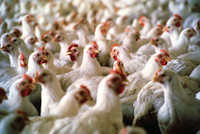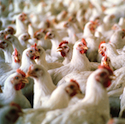 The 1921 Packers and Stockyards Act (PSA) prohibits price discrimination by meatpackers against small and midsize farmers. He will also strengthen anti-monopoly laws; change federal agriculture policy to strengthen producer protection from fraud, abuse, and market manipulation; and make sure that farm programs are helping family farmers, as opposed to large, vertically integrated corporate agribusiness.
The 1921 Packers and Stockyards Act (PSA) prohibits price discrimination by meatpackers against small and midsize farmers. He will also strengthen anti-monopoly laws; change federal agriculture policy to strengthen producer protection from fraud, abuse, and market manipulation; and make sure that farm programs are helping family farmers, as opposed to large, vertically integrated corporate agribusiness.
In a case that proves the PSA can work effectivel, a group of poultry farmers were awarded over $14,000,000 in a case against OK Farms, one of the nation’s largest chicken processors. Their contracts prohibited them from selling chickens to other processing companies, while OK Farms was found to have:
- Exercised extensive control over almost all aspects of production and pay;
- Stretched out the time between providing flocks of chickens to the growers;
- Reduced the number of chickens provided;
- Required that farmers make costly upgrades to chicken houses not specified in the original agreement; and
- Shared information with other vertically integrated poultry processing companies that was not made available to the farmers, resulting in a severe asymmetry of information about the poultry market.
New Grain Inspection, Packers and Stockyards Administration (GIPSA) rules have been proposed – and commentary is open through November 22 – that could change how the PSA is enacted. Section 201.211 – Undue or Unreasonable Preferences or Advantages; Undue or Unreasonable Prejudice or Disadvantages – prohibits meatpackers from discriminating against family farm and ranch livestock producers by paying them less than they pay mega-producers for the same quality hogs and cattle. The value of the livestock, not the volume, should be the determining factor in setting price.
Find a section by section description of the new rules here: Monopoly Practices Divide Rural America.

